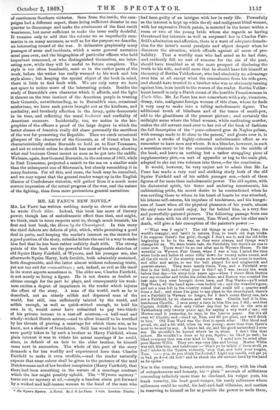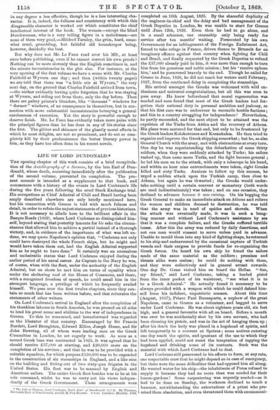MR. LE FANU'S NEW NOVEL.*
MR. LE Farm has written nothing nearly so clever as this since he wrote Uncle Silas. Indeed, this book has more of literary power, though less of melodramatic effect than that, and might, we think, rank in some respects next to, though much beneath, his first and best book, the House by the Churchyard. In this story the chief defects are defects of plot, which, while promising a good deal in parts, and keeping the reader's interest on the stretch for a good portion of the story, subsides before the end in a way to make him feel that he has been rather unfairly dealt with. The strong points of the book are the powerful but disagreeable sketches of old Squire Harry Fairfield, of Wyvern, and his younger son, also afterwards Squire Harry, both forcible, both admirably sustained, both disagreeable, and the latter almost without redeeming traits, yet not too evil for vraisemblance ; not, indeed, so evil as life itself in its worst aspects sometimes is. The elder son, Charles Fairfield, is not nearly so living a figure. He is not drawn as foolish or obtuse enough for the part he plays, and consequently his weak- ness excites a degree of impatience in the reader which injures the effect of the story. A man of the world, such as he is described, not an utterly selfish and depraved man of the world, but still, one sufficiently tainted by the world, and selfish enough, as well as quick-witted enough, to hold his own in it, would never have submitted to pay two-thirds of his private income to a cast-off mistress,—a half-mad and wholly-wicked Dutch actress,—and to allow himself to be terrified by her threats of proving a marriage for which there was, as he knew, not a shadow of foundation. Still less would he have been even partly taken in by such a brother as Harry Fairfield, whose plain interest it was to vitiate his actual marriage if he could, since, in default of an heir to the elder brother, he himself came next in succession. The whole of this part of the story demands a far less worldly and experienced hero than Charles Fairfield to make it even credible,—and the reader naturally expects that some colour shall be given to the pretence of the mad Dutchwoman and of her brother conspirator (Harry Fairfield), that there had been something in the nature of a marriage contract which the law might possibly uphold. The "Wyvern mystery" turns out no mystery at all,—simply a baseless claim put forward by a wicked and half-insane woman to the hand of the man who • The ;rimers Mystery. A Novel. By J. S. Le Faun. 3 vols. London: Tinsley. had been guilty of an intrigue with her in early life. Powerfully as the interest is kept up while the sly and malignant blind woman, with her expressive Dutch patois, is secreted in the house within a room or two of the young bride whom she regards as having threatened her interests as well as surpassed her in Charles Fair- field's admiration and affection, there is a want of adequate founda- tion for the latter's moral paralysis and abject despair when he discovers the situation, which offends against all sense of pro- bability. That a worldly man who had acted as he had done, and evidently felt no sort of remorse for the sin of the past, should have trembled so at the mere prospect of disclosing the truth to his wife, and still more that he should have felt himself at the mercy of Bertha Velderkaust, who had absolutely no advantage over him at all except what the concealment from his wife gave, and should have trusted to a brother who was so obviously turning against him, is an insult to the reason of the reader. Bertha Velder- kaust herself is only a Dutch recast of the horrible Frenchwoman in Uncle Silas. Mr. Le Fanu has met somewhere with a sly, vivacious, dressy, vain, malignant foreign woman of this class, whom he finds it very easy to make into a telling melodramatic figure. The additional touch of blindness and of the traces of small-pox, add to the ghastliness of the present picture ; and certainly the midnight scene where the blind woman, while meditating murder, makes the old servant read over to her out of the book of fashions the full description of the "puce-coloured gros de Naples pelisse, with corsage made to fit close to the person," and gloats over it, is as good a stroke of highly-coloured melodramatic effect as we remember to have seen anywhere. It is a blunder, however, in such a sensation story to let the sensation culminate in the middle of the book, and leave us nothing but a rather straggling piece of supplementary plot,—a sort of appendix or tag to the main plot, adapted to eke out two volumes into three,—for the conclusion.
It would, however, be very unjust not to admit that Mr. Le Fanu has made a very real and striking study both of the old Squire Fairfield and of his selfish younger son,—both of them figures of far more than melodramatic power. The old squire, with his dictatorial spirit, his fierce and enduring resentments, his unblenching pride, his secret desire to be contradicted when he was reviling those to whom in his heart of hearts he was attached, his intense self-esteem, his impulses of tenderness, and his hungri- ness of heart when all the physical pleasures of his youth, almost the only ones he could enjoy, lay far behind him, is a very fine and powerfully-painted picture. The following passage from one of his chats with his old servant, Tom Ward, after his elder son's death, will give a fair conception of the painter's power :—
,,‘ What was I sayin' ? The old things is out o' date, Tom ; the world's changin', and 'tain't in nature, Tom, to teach old dogs tricks. I do suppose there's fun goin', though I don't see it, and the old folks beginning to be in the way, as they were always, and things won't change for us. We were brave lads, we Fairfields, but there's no one to come now. There won't be no one after me in Wyvern House. To the wrestlin' on Wyvern Fair Green, when I was a boy, I mind the time when lords and ladies id come ridin' down for twenty miles round, and all the old stock o' the country, some on horseback, and some in coaches, and silks and satins, to see the belt played for and singlestick and quarter-staves. They were manly times, Tom, and a Fairfield ever first in the field, and—what year is this ? ay, I was twenty the week before that day—'tis sixty-four years ago—when I threw Dick Dutton over my shoulder and broke his collar-bone, and Dutton was counted the best man they ever brought down here, and Meg Weeks—ye'll mind Meg Weeks, wi' the hazel eyes—was lookin' on ; and the wrestlin's gone, and not a man left in the country round that could tell a quarter-staff from a flail ; and when I'm gone to my place in the churchyard, there's not a Fairfield in Wyvern no longer, for I don't count Harry one, he's not a Fairfield, by no chance, and never was. Charlie had it in him, handsome Charlie. I seen many a turn in him like me, I did ; and that Captain Jolliffe'e died only t'other day that he shot in the arm at Tewkesbury only twenty years ago, for Baying' a wry word o' me ; old Morton read it yesterday, he says, in the Lun'on paper. But its all over wi' Charlie, and—stand up, Tom, and fill yer glass, and we'll drink to him.' Old Tom Ward was the first to speak after. Hot blood and proud, sir, and a bit wild, when he was young ; more than that, there's flout to be said by any. A brave lad, sir, and the good-naturedest lever see. He shouldn't be buried where he is, alone. I don't like that nohow. He wouldn't a done so by you, Squire ; he liked ye well ; he liked everyone that was ever kind to him. I mind how he cried after poor Master Willie. They two was very like and loving. Master Willie was tall, like him, and handsome.'—` Don't ye be talkin' o' them at all, ye fool !' broke in the Squire, violently, 'stop that, and hold your tongue, Tom. — you, do you think I'm foolish ? Light my candle, and get ye to bed, ye d—d old fool!' and he shook the old servant hard by the hand as he spoke."
Nor is the cunning, horsey, avaricious son, Harry, with his cloak of outspokenness and honesty, his " plain " avowals of selfishness concealing infinitely more than he disclosed, his vulgar jests, his frank voracity, his loud good-temper, his ready sullenness where sullenness could be useful, his half-and-half villainies, and caution in reserving to himself as far as possible the power to undo them, in any degree a less effective, though he is a less interesting cha- racter. It is, indeed, the fullness and consistency with winch this disagreeable character is worked out which constitutes the chief intellectual interest of the book. The women—except the blind Dutchwoman, who is a very telling figure in a melodrama—are none of them very good,—Mildred Tarnley, the grim, hard, some- what cruel, grumbling, bat faithful old housekeeper being, however, decidedly the beat.
But why does not Mr. Le Farm read over his MS., at least once before publishing, even if he cannot correct his own proofs? Nothing can be more slovenly than the English sometimes is, and the minute inconsistencies in the plot also. For instance, at the very opening of the first volume we have a scene with Mr. Charles Fairfield at Wyvern one day ; and then (within twenty pages) we are told that there was "a little stir at Wyvern," the very next day, on the ground that Charles Fairfield arrived from town, —the author evidently having quite forgotten that he was staying at Wyvern, and riding out from there, only the day before. Then there are paltry printer's blunders, like " dormant " windows for " dormer" windows, of no consequence in themselves, but in con- nection with more substantial inconsistencies betraying a general carelessness of execution. Yet the story is powerful enough to deserve finish. Mr. Le Fanu has evidently taken more pains with the principal figures than he has done in any of his stories since the first. The glitter and shimmer of the ghastly moral effects in which he most delights, are not so prominent, and do not so com- pletely kill by their predominance the better literary power in him, as they have too often done in his recent novels.































 Previous page
Previous page